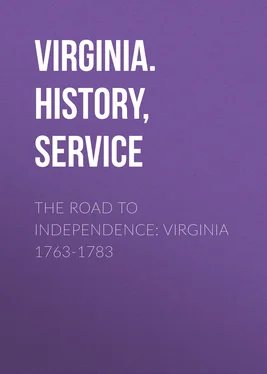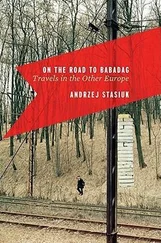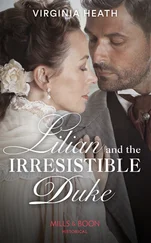Virginia. History, Government, and Geography - The Road to Independence - Virginia 1763-1783
Здесь есть возможность читать онлайн «Virginia. History, Government, and Geography - The Road to Independence - Virginia 1763-1783» — ознакомительный отрывок электронной книги совершенно бесплатно, а после прочтения отрывка купить полную версию. В некоторых случаях можно слушать аудио, скачать через торрент в формате fb2 и присутствует краткое содержание. Жанр: foreign_prose, История, foreign_edu, foreign_antique, на английском языке. Описание произведения, (предисловие) а так же отзывы посетителей доступны на портале библиотеки ЛибКат.
- Название:The Road to Independence: Virginia 1763-1783
- Автор:
- Жанр:
- Год:неизвестен
- ISBN:нет данных
- Рейтинг книги:4 / 5. Голосов: 1
-
Избранное:Добавить в избранное
- Отзывы:
-
Ваша оценка:
- 80
- 1
- 2
- 3
- 4
- 5
The Road to Independence: Virginia 1763-1783: краткое содержание, описание и аннотация
Предлагаем к чтению аннотацию, описание, краткое содержание или предисловие (зависит от того, что написал сам автор книги «The Road to Independence: Virginia 1763-1783»). Если вы не нашли необходимую информацию о книге — напишите в комментариях, мы постараемся отыскать её.
The Road to Independence: Virginia 1763-1783 — читать онлайн ознакомительный отрывок
Ниже представлен текст книги, разбитый по страницам. Система сохранения места последней прочитанной страницы, позволяет с удобством читать онлайн бесплатно книгу «The Road to Independence: Virginia 1763-1783», без необходимости каждый раз заново искать на чём Вы остановились. Поставьте закладку, и сможете в любой момент перейти на страницу, на которой закончили чтение.
Интервал:
Закладка:
The house resolutions included ringing phrases which would become familiar in the 1760's:
The Rights of the Subject are so secured by Law, that they cannot be deprived of the least Part of their Property, but by their own Consent; Upon this excellent Principle is our Constitution founded … That the said Demand is illegal and arbitrary, contrary to the Charters of this Colony, to his Majesty's and his Royal Predecessor's Instructions to the several Governors, and the Express Order of his Majesty King William of Glorious Memory … That whoever shall hereafter pay a Pistole … shall be deemed a betrayer of the Rights and Privileges of the People. 7 7 Journal of House of Burgesses, 1752-1758, 143, 154-155.
The author of these resolves was Richard Bland, a tough-minded burgess from Prince George County, descendant of one of the colony's oldest families. One of the earliest graduates of the College of William and Mary to achieve a major position in the burgesses, he was one of the most widely read. He held four beliefs common to the revolutionary generations, beliefs he translated into major works during the Pistole Fee Controversy, the Parsons' Cause, the Stamp Act, and the later revenue crises:
the eternal validity of the natural-law doctrines most cogently stated by John Locke;
the superiority over all other forms of government of the English Constitution, of which an uncorrupted model or extension was the peculiar property of the Virginians;
the like superiority of those unique rights and liberties which were the heritage of the free-born Englishman; and
the conviction that the good state rests on the devotion of men of virtue, wisdom, integrity, and justice. 8 8 : Clinton Rossiter, Six Characters in Search of a Republic (Harcourt, Brace: New York, 1964), chap. 5, "Richard Bland, the Whig in America", 184).
In addition to the house resolutions, Bland wrote a closely reasoned essay attacking the Pistole Fee, A Modest and True State of the Case(1753). Only a portion survives and is known as A Fragment Against the Pistole Fee. His underlying principle, one which the British ignored and Virginians never forget, is cogently set forth.
The Rights of the Subjects are so secured by Law that they cannot be deprived of the least part of their property without their own consent. Upon this Principle of Law, the Liberty and Property of every Person who has the felicity to live under a British Government is founded. The question then ought not to be the smallness of the demand but the Lawfulness of it. For if it is against Law, the same Power which imposes one Pistole may impose a Hundred …
LIBERTY & PROPERTY are like those precious Vessels whose soundness is destroyed by the least flaw and whose use is lost by the smallest hole.
Virginians never deviated from this view.
In 1818 John Adams, when asked what was the Revolution, replied, "the Revolution was effected before the war commenced. The Revolution was in the minds and hearts of the people … This radical change in the principles, sentiments, and affections of the people, was the real American Revolution." In Virginia, the Revolution began in the minds and hearts of the House of Burgesses with the Pistole Fee. Its author was Richard Bland.
The third event was the Parsons' Cause. This event reached the people, and in it the people found a spokesman—Patrick Henry. The Parsons' Cause was an outgrowth of the Two-Penny Acts. Nearly all Virginia salaries and most taxes were paid in tobacco, rather than specie (hard money). Many officials, including the clergy, had their salaries set by acts of the assembly at a specified number of pounds of tobacco per year. In the case of the clergy this was a minimum of 16,000 lbs. per year. In the 1750's a series of droughts and other natural disasters brought crop shortages in some areas, driving tobacco prices well beyond normal levels. In 1753 and again in 1755 the assembly allowed taxpayers to pay taxes in either tobacco or specie at the rate of two pennies per pound of tobacco owed. On one hand this seemed eminently fair. The crop shortages worked a double penalty on the planter—he had little tobacco because of the weather, but he was forced to pay his taxes in valuable tobacco he did not have. On the other hand, the clergy and others protested they received no relief when tobacco was in oversupply and the price was low. More importantly, they had a contract which had been enacted into law and approved by the king. No assembly could repeal a law approved by the king without his approval. In 1753 and 1755 the issue faded away.
Then in 1758 the assembly passed another Two-Penny Act, applying throughout the colony and to all officials and even to private debts. Governor Francis Fauquier, although knowing that he could not put such a law into effect until the king had given his approval, decided he would do the politically expedient thing and signed the bill.
Fauquier reckoned without the tenacity of the clergy led by the Rev. John Camm, a William and Mary college professor and parish pastor. Camm, whom Fauquier called "a Man of Abilities but a Turbulent Man who Delights to live in a Flame", later became President of the college, rector of Bruton Parish Church, and a member of the council.
In 1759 he was determined to receive what he believed was his guaranteed salary. Camm believed the law unconstitutional on two grounds: the assembly had passed a law repealing one already approved by the king, and Fauquier had permitted the law to go into effect without the suspending clause period taking place. At the behest of many Anglican clergy, Camm went to England. Presenting the parsons' case to the Bishop of London, who in turn forwarded the case to the Privy Council, Camm succeeded. The king declared the law unconstitutional.
Virginians were outraged. Unlike the Pistole Fee, which touched most directly the larger planters and the burgesses, the Parsons' Cause enflamed the entire populace. Camm and a number of clergymen sued in county courts for back salary. They received little satisfaction. Several county courts went so far as to declare the Two-Penny Act legal despite the king's disallowance.
Hanover County Court took a different tack. There the Rev. James Maury, Jefferson's field school teacher and hard-pressed father of 11 children, sued the vestry of Fredericksville Parish for his salary. The county court upheld his right to sue for claims and called for a jury trial to set the damages. Ironically, one of the clergymen who would benefit from a favorable verdict for Maury was the Rev. Patrick Henry. Presiding over the county court on December 1, 1763, was his brother, John Henry. Defending the parish vestry was his nephew and namesake, and the son of the justice, Patrick Henry. Hanover County was a center of Presbyterianism and in the jury box undoubtedly sat men who already had a dislike for Anglican clergymen whose salaries they were compelled to pay but whose churches they did not attend.
Young Patrick Henry, in his first prominent trial, launched immediately into a scathing attack on the established clergy, calling them "rapacious harpies", men who would "snatch from the hearth of their honest parishioners his last hoe-cake, from the widow and her orphan children their last milch cow; the last bed, nay, the last blanket from the lyin-in woman". Having stunned his audience into silence, Henry turned his invective upon the king. Although the constitutionality of the law was not an issue, because the county court had already decided it was constitutional, Henry proceeded to excoriate the king himself for violating the English constitution. His biographer, Robert Meade, notes:
Henry insisted on the relationship and reciprocal duties of the King and his subjects. Advancing the doctrine of John Locke as popularized by Richard Bland and other colonial leaders, he contended that government is a conditional compact, composed of mutually dependent agreements 'of which the violation by one party discharged the other'. He bravely argued that the disregard of the pressing wants of the colony was 'an instance of royal misrule', which had thus far dissolved the political compact, and left the people at liberty to consult their own safety. 9 9 Robert D. Meade, Patriot in the Making (Patrick Henry) (Lippincott: Philadelphia, 1957), 132.
Интервал:
Закладка:
Похожие книги на «The Road to Independence: Virginia 1763-1783»
Представляем Вашему вниманию похожие книги на «The Road to Independence: Virginia 1763-1783» списком для выбора. Мы отобрали схожую по названию и смыслу литературу в надежде предоставить читателям больше вариантов отыскать новые, интересные, ещё непрочитанные произведения.
Обсуждение, отзывы о книге «The Road to Independence: Virginia 1763-1783» и просто собственные мнения читателей. Оставьте ваши комментарии, напишите, что Вы думаете о произведении, его смысле или главных героях. Укажите что конкретно понравилось, а что нет, и почему Вы так считаете.












